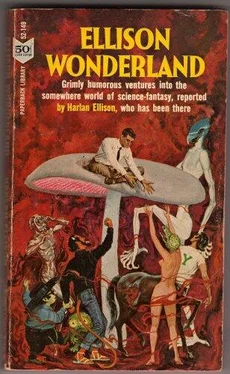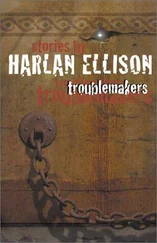There was a broken-nosed statue of Leon Packett on the third tier, many miles from where the Frericks Foundation had stood. A statue that called him one of the great inventors of all time and all Mankind. There were no scissors in the statue.
When the ship came down past the Moon, and its warning gear telemetered out the recog-signals, the Earth Central control tower was lost in disbelief. A sloe-eyed brunette who was in charge of deciphering and matching recog-signals with the call letters of those ships out, called for a checker. Her section chief, a woman who had been on the job for eighteen years, matched the recog-signals, and turned to the younger girl with a word lost on her lips. The call went in to Guard Central immediately.
They denied landing co-ordinates to the W-1 and held it aspace till they had found the records in the sub-cellar of the pleasure sanctuary on the third level. When they had the files, they knew the story completely, and they sent word to berth-in the W-1.
Walkaway looked the same.
Huge and graceful, his face vaguely human, his body a sort of homo sapiens plus, he slid down a nylex rope from the cargo aperture of the sundial-shaped ship. He had not bothered to lower the landing ramp. As he came down the single strand, his metallic reflection shone in the smooth landing-jack’s surface. The reflection of Walkaway shone down and down and over again down as he slid quickly to the pad.
They watched, as they might watch a legend materialize. This was the fabled robot that had gone out to seek the stars in Carina, and had returned. Three hundred and sixty-five years the W-1 had been away, and now it had returned. What would the vid-cameras of this perambulating robot show? What wonders awaited man, now that his interest was roused in the immensities of space? The Guard watched, ranked around the pad, as Walkaway slid down the nylex rope. The great sundial-shaped ship held high above them—unlike any other of the sleek vessels in the yard—tripod poised on its high-reaching legs.
Then the robot touched Earth, and a shout went up.
Home is the hunter, home from the hill…
Three hundred and sixty-five years. No one was left who remembered this creature of flawless metal. No one who had seen Walkaway go out on the shuttle to Bounce Point.
Bounce Point that was itself two hundred years dust. Gone in the struggle for the Outer Cold Ones. The robot came across the pad, his shining feet bright against the blackened pad-rock, and his close-up turret ground near-to-silently away, taking in the reception ceremony for posterity.
Before the Guard representative could issue forth with the practiced phrases of a hundred other receptions, the robot said clearly, “It is good to be back. Where is Leon Packett?”
How strange it was—they said later—a legend stood asking them about another legend. Paul Bunyan inquiring after Zeus. What could they say? Few of them even knew of the man named Leon Packett. Those who knew, were vague where he was concerned. After all, three hundred and sixty-five years. The Earth had changed. “I asked: where is Leon Packett? Which of you is from the Frericks Foundation?”
There were no answers. And then someone in the front ranks of the Guard, someone who knew his history, said: “You have been gone three hundred years and more, robot.”
“Leon Packett…?”
“Is dead,” finished the Guardsman. “Long dead. Where have you been so long?”
And a circuit closed as data was fed to Walkway.
And the future was assured.
Loneliness. Leon Packett had done his work well. The attempts to take Walkaway back to the drawing boards would have shown them what Packett had done. He had freed the robot’s soul completely. Not only legally, but in actuality. Walkaway felt great sadness. There had only been one other who knew his inner feelings. That had been Leon Packett. There had been empathy between them. The man a bit mad, the robot a bit man. They had spent evenings together, as two childhood friends might have; the man and the faceless metal creature, product of the man’s mind. They had not talked much, but a word had brought understanding of concepts, of emotions:
“All of them.”
The robot immobile, answering metallically, “Power.”
“Someday, someday…”
“Checks.”
“Balances.”
“Oh, Walkaway. Someday, just someday!”
“I know.”
The nights had passed restlessly for Packett, while the sickness within him festered. The robot had been constructed in the image of the man. Seeing everything through its vid-eyes, hearing everything through its pickups, but saying little, working hard. Then Packett had known he would die, and Walkaway would live on. An extension of himself; the sword he would someday wield.
He had worked long into the night, foreseeing where others would not foresee, could not foresee, though they had the knowledge. For Leon Packett had been gifted. Sick, but gifted, and he had left his curse, left his justice, left his vengeance, to live on after he was gone.
Walkaway learned of Leon Packett’s death, and the circuit Packett had tampered with, that he had wanted to close at the knowledge of his death, snapped to with a mental thud that only Walkaway felt, that the universe was soon to know.
The robot turned to the Guardsmen and made the one request no one would have considered, the one request that was his legally to make:
“Pay me my wages.”
Three hundred and sixty-five years on Earth. Nine months and fifteen days in space. The warp-drive had been better than ghosts had thought. Memories of McCollum and his fellows from MIT lived within the force bead, and had given it power. Better, far better, it had been, than their wildest imaginings. But Einstein had been correct. Mass, infinity, time zero. He had been correct, and Walkaway had earned three hundred and sixty-five years worth of wages. Per diem. Plus travel pay according to military regulations. They could not withhold it on grounds that he was using military transportation; Leon Packett had seen to that: Walkaway was a private citizen.
Plus interest accrued.
The sum was staggering. The sum was unbelievable. The sum could, would, must bankrupt the Earth government. It was unheard-of. The Prelate convened, and the arguments raged, but Walkaway needed no defense. He merely requested: “Pay me my wages.” And they had to do it.
Oh, they tried to dodge their way out of it. They tried to ensnare him in legalities, but he was a man of alumasteel, and legalities could not affect him.
The circuit had closed, and his life’s plan was set. In the mind of Walkaway burned the conscience and soul of his creator. Leon Packett was not dead. In his creation was re-born the intense, vibrant hatred of power and government and authority. In Walkaway was the perfect weapon; indestructible, uncaring, human as human it need be, inhuman as inhuman it must be, to bring about the downfall of that which Packett had despised.
Fifteen years in a cellar laboratory had carried forth for over three hundred years, and the future was molded on printed circuits.
Finally, they acceded. They paid him his wages. The government of Earth was bankrupted. The world belonged to a man of alumasteel. It was no longer Earth. Had he wished, he might have named it Walkaway’s World. For such it was.
Leon Packett had foreseen much. He had applied Einstein’s equations, and he had known what would happen. The scientists of the Frericks Foundation had known, also, and they had considered it all. But the job had had to be done, in that era before Man had turned inward once more. They had feared what might happen, but not considered it an inevitability. They had looked on it the way the farmer looks on earthquake. Yes, it might happen, but that would be an act of God, not a thing that must be.
Читать дальше












